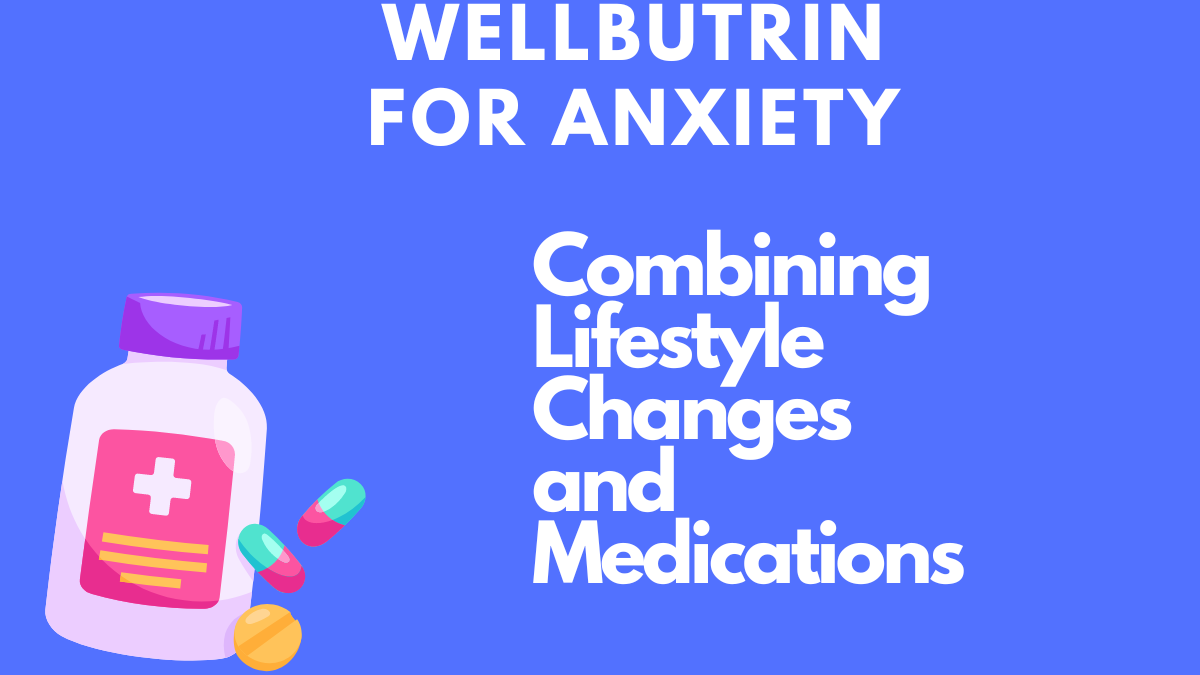For many people, wellbutrin has been a beneficial drug for depression and anxiety. It is frequently recommended. Medication by itself, meanwhile, might not be enough to fully treat anxiety. Knowing what to take with Wellbutrin to treat anxiety can improve therapy results dramatically. This article, which includes insights from psychologists to walk you through practical techniques, examines how combining lifestyle modifications with Wellbutrin can offer a more comprehensive approach to controlling anxiety.

Table of Contents
Understanding Wellbutrin and Its Role in Anxiety Treatment
Although wellbutrin, also known as bupropion, is mainly used to treat depression, anxiety sufferers may also benefit from its use. In contrast to other antidepressants, Wellbutrin regulates mood by preventing the reuptake of the neurotransmitters dopamine and norepinephrine. Wellbutrin can reduce anxiety symptoms, but it works best when used in conjunction with other tactics.
Lifestyle Changes to Pair with Wellbutrin for Anxiety
1. Regular exercise
One effective strategy for reducing anxiety is to exercise. Regular physical activity causes the release of endorphins, which are organic mood enhancers. Research has indicated that for certain individuals, exercise can be just as beneficial as medication in mitigating symptoms of anxiety.
Incorporating Exercise into Your Routine
Start Slow: Start with mild yet powerful exercises like yoga or walking.
Consistency is key: On most days of the week, try to get in at least 30 minutes of exercise.
Find What You Enjoy: To keep yourself motivated, pick fun hobbies, such as hiking, dancing, or swimming.
2. A balanced diet
Anxiety levels can be significantly impacted by eating a balanced diet. Anxiety symptoms can be made worse or better by certain foods.
Foods to include
Omega-3 Fatty Acids: Omega-3s, which are present in walnuts, flaxseeds, and seafood like salmon, have been related to a decrease in anxiety.
Whole grains: These assist in preserving stable blood sugar levels, which might lessen mood fluctuations.
Fruits and vegetables: promote general brain health because they are high in vitamins and antioxidants.
Foods to avoid
Caffeine: can worsen anxiety and interfere with sleep.
Sugar: can result in energy crashes that compromise emotional stability.
Processed foods: are frequently rich in chemicals and harmful fats that are detrimental to mental wellness.
3. Mindfulness and Meditation
Meditating Meditation and mindfulness are useful coping mechanisms for anxiety. These techniques, which emphasize present-moment awareness, can lessen the negative effects of stress.
How to practice mindfulness and meditation
Set Aside Time: Every day, even ten minutes can have an impact.
Find a Quiet Space: Pick a location where you won’t be bothered.
Use Guided Meditations: For those who are new to the app scene, guided sessions are available through Headspace and Calm.
4. Quality sleep
Sleep is essential to mental well-being. Anxiety might worsen from inadequate sleep, resulting in a vicious cycle.
Tips for better sleep
Establish a routine: Every day, go to bed and wake up at the same hour.
Create a Relaxing Environment: Maintain a cold, quiet, and dark bedroom.
Limit Screen Time: Reduce your exposure to blue light, which can disrupt your sleep, by avoiding screens for at least an hour before going to bed.
Combining medications with lifestyle changes
Changing one’s lifestyle and taking medicine together provide a comprehensive approach to managing anxiety. The way these components interact is as follows:
1. Medication Adherence
It’s important that you follow your Wellbutrin prescription exactly. Anxiety might return if a medicine is suddenly stopped or if there are withdrawal symptoms.
Tips for Medication Adherence
Set reminders: Make use of smartphone apps or alerts to help you remember to take your prescription.
Keep Track: To remember your dosages, use a pill organizer.
Communicate with Your Doctor: Consult your healthcare physician on a regular basis to address any worries or adverse effects.
2. Therapy and counseling
Cognitive-behavioral therapy (CBT), in particular, is a very successful psychotherapy for anxiety. Your treatment strategy will be more effective overall if you combine Wellbutrin with therapy.
Benefits of Therapy
Identify Triggers: The root causes of anxiety can be found with the aid of therapy.
Develop Coping Strategies: Discover useful methods for controlling the symptoms of anxiety.
Support System: Speaking with a specialist might help you feel supported and guided emotionally.
3. Support Groups
Getting involved in a support group helps foster understanding and a sense of community. Talking to people who are going through similar things about your experiences can be uplifting and consoling.
Finding a Support Group
Local Resources: To find out about local support groups, contact your local hospital or mental health organizations.
Online Communities: There are online forums and support groups available on websites such as the Anxiety and Depression Association of America (ADAA).
4. Holistic Practices
Including complementary therapies like massage, aromatherapy, and acupuncture can enhance your anxiety management. These techniques can aid in relaxation and stress reduction.
Examples of Holistic Practices
Acupuncture: This age-old Chinese medical technique can lessen anxiety and help the body’s energy levels balance.
Aromatherapy: Anxiety symptoms can be lessened and relaxation encouraged by using essential oils like chamomile and lavender.
Massage Therapy: Frequent massages can ease tense muscles and enhance wellbeing.
Expert Insights on Combining Wellbutrin with Lifestyle Changes
Psychologists stress that an all-encompassing treatment approach is essential for effectively treating anxiety. “Medication like Wellbutrin can be a valuable part of an anxiety treatment plan, but it’s most effective when combined with lifestyle changes and therapeutic interventions,” says clinical psychologist Dr. Emily Harrison. It involves treating the body and mind as a unit.
Dr. Harrison highlights several key points:
Personalization: Everybody has a different experience with anxiety. One person’s solution might not be another’s. Customizing your treatment plan is crucial.
Consistency: Maintaining consistency in lifestyle modifications and medicines is essential. A healthy diet, regular exercise, and enough sleep can lay a solid foundation for mental well-being.
Professional Support: Frequent check-ins with medical professionals guarantee that any necessary modifications to therapy or medication can be performed quickly.
Practical Steps to Implementing These Changes
1. Create a plan.
Create a detailed plan that covers your nutrition, exercise routine, medication schedule, and mindfulness exercises. Put it in writing and place it somewhere you’ll see it every day.
2. Set realistic goals.
Begin with modest, doable objectives. For instance, start with the goal of exercising three times a week and work your way up to a higher frequency as you get more accustomed to it.
3. Seek support.
Never be reluctant to ask friends, family, or a mental health professional for assistance. Support networks can offer accountability and motivation.
4. Track your progress.
Maintain a journal to monitor your development. Make a note of your feelings, any shifts in your anxiousness, and any difficulties you run into.
5. Be patient.
It is crucial to keep in mind that anxiety management is a process. Finding the ideal pharmaceutical regimen and lifestyle adjustments may take some time.
Conclusion
Knowing what to take with Wellbutrin to treat anxiety can greatly improve the results of your treatment. You can develop a comprehensive strategy for controlling anxiety by integrating medicine with lifestyle modifications, including consistent exercise, a healthy diet, mindfulness exercises, and adequate sleep. You may improve your mental health journey even more by including holistic methods, counseling, and support groups. Recall that expert assistance, customization, and consistency are essential for success. You may effectively control anxiety and enhance your general well-being by following these methods.
Frequently Ask Questions(FAQ)
What is Wellbutrin and how does it help with anxiety?
Although wellbutrin, also known as bupropion, is primarily prescribed to treat depression, anxiety disorders can also benefit from its use. It functions by preventing the reuptake of dopamine and norepinephrine, two neurotransmitters involved in mood control. Although it reduces anxiety symptoms, it works best when paired with other therapies and lifestyle modifications.
What lifestyle changes should I pair with Wellbutrin for anxiety?
Consider including regular exercise, a balanced diet, mindfulness and meditation practices, and making sure you get enough sleep to improve the efficacy of Wellbutrin for anxiety. These alterations to lifestyle can aid in more thorough anxiety management.
How does exercise help with anxiety when paired with Wellbutrin?
Exercise can greatly lessen the feelings of anxiety because it releases endorphins, which are naturally occurring mood enhancers. Frequent exercise enhances the benefits of Wellbutrin by lowering stress levels and improving general mental wellness.
What types of foods should I include in my diet to help manage anxiety?
Incorporate whole grains, an abundance of fruits and vegetables, and foods high in omega-3 fatty acids (such as walnuts, salmon, and flaxseeds). These meals can help calm the mood and promote brain function. Steer clear of processed meals, sweets, and caffeine, as they can make anxiety worse.
How can mindfulness and meditation practices benefit those taking Wellbutrin for anxiety?
By encouraging an emphasis on the here and now, mindfulness and meditation help people feel less stressed. These techniques can improve how wellbutrin reduces anxiety by assisting people in better controlling their thoughts and emotions.
Why is quality sleep important when managing anxiety with Wellbutrin?
Restful sleep is essential for mental well-being. Anxiety can be made worse by poor sleep, although overall wellbeing and mood stability are maintained by adequate sleep. Wellbutrin’s effectiveness can be enhanced by establishing a regular sleep schedule and designing a peaceful sleeping environment.
Can therapy and counseling improve the effectiveness of Wellbutrin for anxiety?
Indeed, taking Wellbutrin in addition to therapy—especially cognitive-behavioral therapy, or CBT—can greatly enhance anxiety management. Therapy improves the entire treatment plan by assisting in the identification of anxiety triggers, helping to develop coping mechanisms, and offering emotional support.
Are there any support groups available for individuals taking Wellbutrin for anxiety?
Yes, there are a variety of online and local support groups. Support groups can be provided by nearby mental health organizations or hospitals, and online communities such as the Anxiety and Depression Association of America (ADAA) offer forums and virtual support groups.
What holistic practices can complement Wellbutrin in managing anxiety?
Acupuncture, aromatherapy, massage therapy, and other holistic therapies can be used in conjunction with Wellbutrin. These techniques assist in lowering stress, encouraging calmness, and enhancing mental wellness in general.
How important is it to adhere to my Wellbutrin medication regimen?
It’s important that you follow your Wellbutrin prescription exactly. Anxiety might return if a medicine is suddenly stopped or if there are withdrawal symptoms. To guarantee correct adherence, make use of a pill organizer, set reminders, and have regular communication with your healthcare professional.

